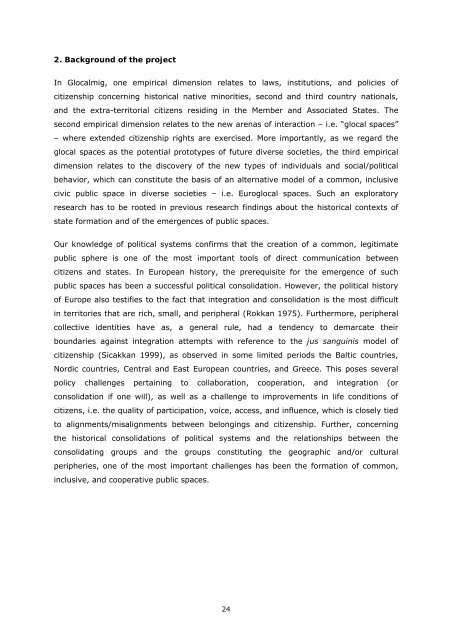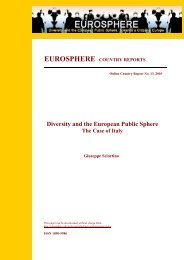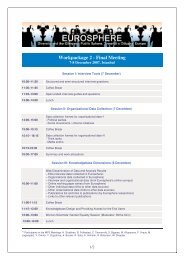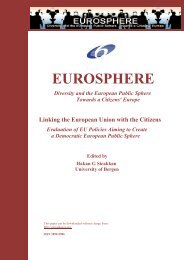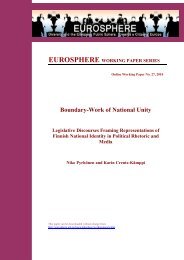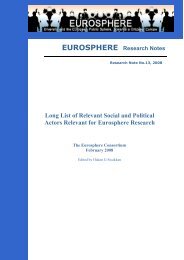Migrants, Minorities, Belongings and Citizenship. Glocalization and ...
Migrants, Minorities, Belongings and Citizenship. Glocalization and ...
Migrants, Minorities, Belongings and Citizenship. Glocalization and ...
You also want an ePaper? Increase the reach of your titles
YUMPU automatically turns print PDFs into web optimized ePapers that Google loves.
2. Background of the project<br />
In Glocalmig, one empirical dimension relates to laws, institutions, <strong>and</strong> policies of<br />
citizenship concerning historical native minorities, second <strong>and</strong> third country nationals,<br />
<strong>and</strong> the extra-territorial citizens residing in the Member <strong>and</strong> Associated States. The<br />
second empirical dimension relates to the new arenas of interaction – i.e. “glocal spaces”<br />
– where extended citizenship rights are exercised. More importantly, as we regard the<br />
glocal spaces as the potential prototypes of future diverse societies, the third empirical<br />
dimension relates to the discovery of the new types of individuals <strong>and</strong> social/political<br />
behavior, which can constitute the basis of an alternative model of a common, inclusive<br />
civic public space in diverse societies – i.e. Euroglocal spaces. Such an exploratory<br />
research has to be rooted in previous research findings about the historical contexts of<br />
state formation <strong>and</strong> of the emergences of public spaces.<br />
Our knowledge of political systems confirms that the creation of a common, legitimate<br />
public sphere is one of the most important tools of direct communication between<br />
citizens <strong>and</strong> states. In European history, the prerequisite for the emergence of such<br />
public spaces has been a successful political consolidation. However, the political history<br />
of Europe also testifies to the fact that integration <strong>and</strong> consolidation is the most difficult<br />
in territories that are rich, small, <strong>and</strong> peripheral (Rokkan 1975). Furthermore, peripheral<br />
collective identities have as, a general rule, had a tendency to demarcate their<br />
boundaries against integration attempts with reference to the jus sanguinis model of<br />
citizenship (Sicakkan 1999), as observed in some limited periods the Baltic countries,<br />
Nordic countries, Central <strong>and</strong> East European countries, <strong>and</strong> Greece. This poses several<br />
policy challenges pertaining to collaboration, cooperation, <strong>and</strong> integration (or<br />
consolidation if one will), as well as a challenge to improvements in life conditions of<br />
citizens, i.e. the quality of participation, voice, access, <strong>and</strong> influence, which is closely tied<br />
to alignments/misalignments between belongings <strong>and</strong> citizenship. Further, concerning<br />
the historical consolidations of political systems <strong>and</strong> the relationships between the<br />
consolidating groups <strong>and</strong> the groups constituting the geographic <strong>and</strong>/or cultural<br />
peripheries, one of the most important challenges has been the formation of common,<br />
inclusive, <strong>and</strong> cooperative public spaces.<br />
24


